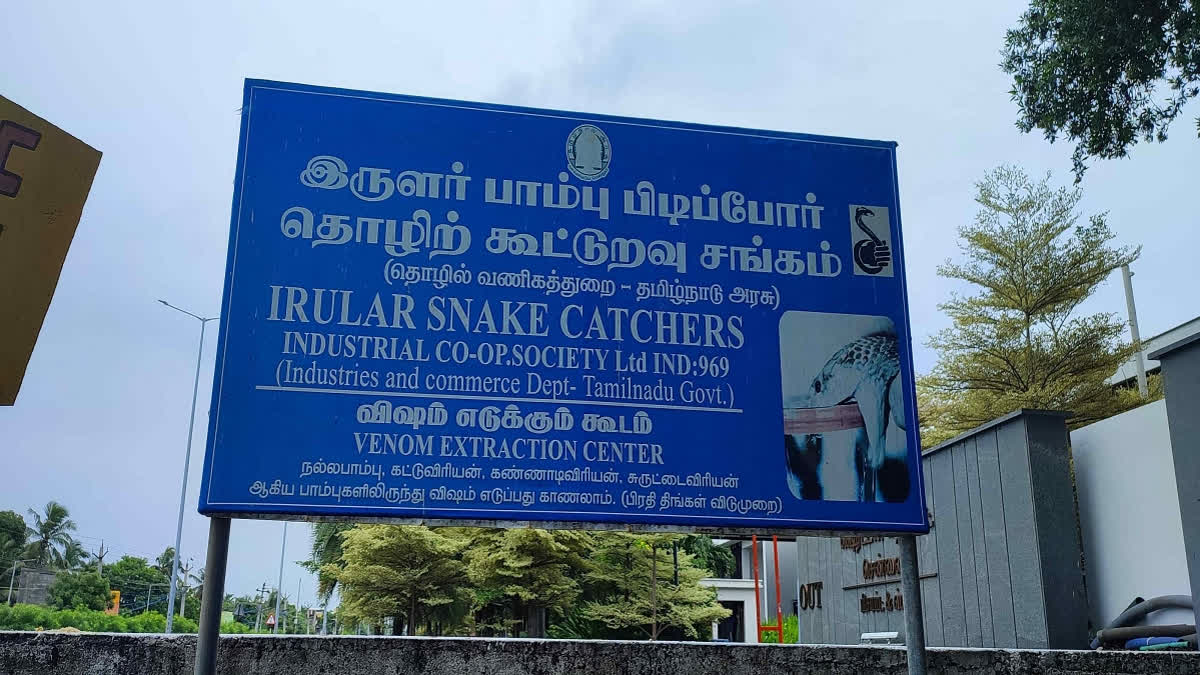Chennai (Tamil Nadu): Snake venom is poisonous but this very substance has become a source of livelihood for a community in Tamil Nadu.
According to the data of the World Health Organization (WHO), 1.38 lakh people die from snakebite every year in the world, including 58,000 people in India. Tamil Nadu has the second-highest number of snakebite deaths in India.
However, people who have been poisoned by snakes, are treated with the same snake venom. The Irular Snake Catchers Industrial Cooperative Society Limited was formed in 1978 to coordinate and systematise the collection of snake venom.
In collaboration with the Tamil Nadu Industry and Commerce Department, Ilurar Snake Catchers Industrial Cooperative Society Limited is functioning in the Vadanemili area next to Mamallapuram.
An officer of the Labor Welfare Department of the Tamil Nadu government is responsible as the Secretary of the association. It consists of the Chairman, Vice Chairman, the Executive Committee members. A snake farm is established and functioning under this association.
According to the government order issued by the Tamil Nadu government every year, the snakes required for this snake farm are caught and the venom is extracted.
From July to March 31, the snakes are caught and handed over to North Nemili Snake Farm. Snakes are not caught for three months of the year.
Balaji, Secretary of the Irular Snake Catchers Cooperative Association operating in Vadanemili, told ETV Bharat, "In this association, 339 men and women are licensed to catch snakes and give them to the farm. We will pay for the snake they catch and get the snakes."
Russell's Viper and Indian Cobra get Rs 2760, Common Krait gets Rs 1020, and Echis Carinatus gets Rs.360.
Licensed members of the Irular community have been catching snakes from districts like Thiruvallur, Kanchipuram, Chengalpattu, Chennai and giving them to the farm. The snakes caught in this way are kept in the farm for 22 days and poison is extracted from a snake four times once in four days. We put a tag on the tail of the poisoned snake and release those snakes safely back to suitable places for the snake to live. Identifying the venomous snake helps to avoid re-envenomation from the same snake in a short period of time, added Balaji.
Repeated ingestion of venom from the same snake within a short period of time is likely to damage the snake's teeth and is therefore identified as a venomous snake. The venom extracted from such captured snakes is sold to various pharmaceutical companies in India. Snake venom is also sent by parcel to pharmaceutical companies. In this respect, in the last 3 years, 1807.150 grams of poison was taken and sold for Rs 5.43 crore. In this, only the net profit of Vada Nemil Snake Farming Association is Rs 2.36 crore," he added.
Why should snakes be conserved?: Snakes play an important role in maintaining bio-balance, especially in agricultural land, controlling rodents is a very challenging task for farmers. They destroy crops and waste 20 times more food. Snakes play a very important role in controlling these rats.
Are all snakes poisonous?: Not all snakes are dangerously poisonous. About 3,500 species of snakes have been identified worldwide. Only 600 species of snakes are venomous. Of these, only 200 species of snakes are venomous enough to kill humans. As far as India is concerned, among the snakes that depend on human habitation, only four species are poisonous enough to kill humans, says Asokan, a forest veterinarian from Coimbatore.
"Already 14 species of snakes are completely extinct. And there are snakes in an endangered environment. The reproductive age of snakes is three to four years. A snake cub is born and grows up and survives for so many years and then there is little chance of reproduction. Therefore, there is little chance of the snake population increasing.
"Apart from this climate change is the main cause of extinction of snakes. Cancerous tumours are more common in snakes. Apart from this, bacterial diseases also attack snakes," added Asokan.
According to Asokan, snakes tend to move towards urban areas due to the lack of food. "Such snakes get hit by vehicles and die. Snakes usually try to stay away from humans. As the rural areas have developed and become urban areas, the number of snakes has decreased," he said.
Quizzed if snakes take revenge, Ashoka said, "Snakes have a great memory. Due to this, even if a snake is caught and taken to another place, it will return to the old place again. There is a false belief among people that snakes come to take revenge on humans."
What to do if you are bitten by a snake?: Amin, who is an expert in catching and handling snakes, says, "It is very important to protect snakes. In Tamil Nadu, Indian Cobra, Common Krait, Echis Carinatus and Russell's Viper - only four types of snakes are poisonous. If you see a snake, you should not kill it immediately. If you see a snake in a residential area, you should immediately report it to the forest department or the snake catchers. They will leave it in the forest area. If you are bitten by snakes, you should go to the nearest government hospital. You should not engage in activities such as tying the snake bite with a rope. Only if there are snakes, there will be a natural balance."



